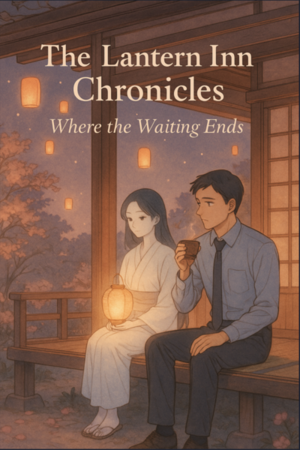Chapter 2:
The Inn With the Lantern That Never Goes Out
Lantern Inn Chronicles
Kaito’s first sensation was warmth.
Not heat — not the searing urgency of summer, nor the artificial glow of office bulbs.
But a gentle, cradling warmth, like sunlight resting on closed eyelids in early spring. The kind that slips past curtains on a lazy Sunday morning, soft and uninvited but welcome all the same.
Then came sound.
Water. Dripping in slow, deliberate intervals.
Not rhythmic like a faucet, but organic — like droplets falling from leaves deep within a forest, or echoing through the stone belly of an ancient temple.
Each drop spaced apart just enough to feel meaningful. Like a clock counting something older than time.
His cheek was resting on wood.
Cool at first, but slowly warming to his skin. The grain beneath him felt worn — smoothed by hundreds of feet, polished not by design but by memory.
There was a scent in the air. Dust, yes. But more than that.
Herbs — maybe dried yarrow or mugwort — mixed with something quietly nostalgic.
Tatami? No… older.
Like the deep, time-softened scent of the wooden cupboards at his grandmother’s countryside house. The ones that held tea cups and secrets. That always smelled faintly of sakura bark, mothballs, and matcha powder lingering in cloth sachets.
He opened his eyes.
The room that greeted him was dimly lit, but not dark. The shadows inside it didn’t threaten — they lingered, like old companions waiting patiently.
The walls were beige, aged into a comforting yellow-brown, like pages of a well-read book. A low wooden table stood nearby, chipped on one corner and proudly so.
Shoji screens filtered in an amber glow — perhaps from sunset, or perhaps from something else entirely.
There was no hum of fluorescent tubes, no distant whir of traffic.
No subtle vibrations from his desk monitor.
No pressure of unread emails.
Only stillness.
Only peace.
Kaito sat up slowly.
His work shirt was gone. In its place, a simple cotton robe — undyed, soft against the skin, with a faint scent of rice starch and line-dried air.
He didn’t remember changing.
Didn’t remember undressing.
Didn’t remember anything after…
He looked down at his hands.
They looked familiar, but somehow… lighter. Paler. Almost translucent in the warm light, like skin painted in watercolor.
No scars. No paper cuts. No ink stains from his broken pen.
Still his hands. But softened — as if time had filed the edges off.
A hospital?
A dream?
Or something else?
Before the thought could settle, the door creaked open.
In stepped a girl.
Perhaps twelve.
She wore a blue kimono, the sleeves slightly too long for her arms, as if it had once belonged to someone older. Her hair was pinned up carelessly, strands falling into her eyes. She moved with the silent confidence of someone who belonged here far more than he did.
In her hands, she held a lantern. Not an electric one. Not plastic.
A candle lantern — old, wooden, carved with tiny sakura blossoms at each corner.
The glass panes shimmered faintly, as if remembering rain.
“You’re awake,” she said softly.
Her voice had no particular inflection, but it carried the hush of sacred places.
Like she didn’t want to scare the air itself.
“You’re… new.”
Kaito blinked. “Where…?”
The girl tilted her head slightly, as if deciding how much to tell him.
“This is the Lantern Inn,” she said. “It’s for people like you.”
“Like me?”
She shrugged. “People who were only noticed when it was too late.”
She set the lantern down beside him.
It gave off a soft glow — not fire exactly, but something golden.
The way starlight might look if it was bottled and whispered to. Like fireflies dreaming inside glass.
“Are you a nurse?” he asked.
The girl smiled faintly. “No. I’m just here.”
So am I, he almost said.
But the words remained in his throat, like a habit he hadn't shaken yet.
She gestured gently toward the door.
“Come. It’s better than staying in bed all day.”
Kaito rose.
Unsteady at first. But not from pain.
Just… from lightness.
As though something inside him — something heavy and quiet — had been peeled away.
Layer by layer.
Until only the center remained.
They stepped into a hallway, narrow and wooden, with soft creaks beneath their steps.
Lanterns hung from the ceiling, their lights flickering as though stirred by memories.
The air was cool, not cold — it felt like dusk trapped inside a house.
They passed several doors. Each had a wooden plate above it.
Room 1 – The Quiet One
Room 4 – The Returning Guest
Room 7 – The One Who Forgot Her Name
Only Room 3 had no nameplate.
The girl didn’t glance at it.
Then they reached a common room — wide, spacious, with high wooden beams overhead.
Sunlight — or something like it — poured in from an open window.
Dust danced in the light like petals. Or ghosts.
A fireplace rested at the far end, dormant and dignified.
A long-extinguished candle sat on the mantle, beside a kettle that hadn’t boiled in years.
Shelves lined the walls — books, old and unread, their titles faded into the paper like ink disappearing into time.
On the far side of the room, resting on a wooden stand, was a large leather-bound ledger.
A guestbook.
The girl approached it and opened it slowly.
Her fingers hovered above blank pages.
“No one’s written in it in years,” she said, barely above a whisper. “But now you’re here.”
Kaito stepped forward.
There — in gentle ink strokes — was his name.
Moriyama Kaito
Room 2. Status: Resting. Lantern: Unlit.
Unlit.
The word felt heavier than the rest.
It sank into his chest like a pebble in a still pond.
“What… is this place really?” he asked.
The girl looked up, her expression unreadable.
“This is a place for those who waited too long to be seen. The ones who stayed late but were never thanked. Who remembered birthdays but were forgotten on their own. Who gave more than they had, quietly. Who never asked for much.”
She touched the lantern again.
“If you stay long enough, your lantern might light. And when it does…”
She hesitated.
“Then you’ll understand why you were really here.”
Later, Kaito wandered out into the garden, drawn not by any particular intention, but by something quiet and magnetic — like the pull of a half-remembered song echoing down a hallway. The wooden floorboards creaked gently beneath his feet as he stepped through the inn’s side corridor, past hanging wind chimes that barely stirred in the still air.
The garden unfolded before him like a hidden chapter in a forgotten novel.
The sky above was the color of a worn-out postcard — brushed in pale lilac and warm gold, as if the heavens had been gently faded by time and tucked away in a drawer full of memories. Clouds drifted slowly, tinged with hues of peach and violet, lazily stretching across a canvas too large to comprehend. The light was neither day nor night — a suspended moment where the world seemed to hold its breath.
A willow tree stood at the far end of the garden, tall and dreamlike, its branches trailing like threads of silk into the empty hush around it. Each leaf shimmered faintly in the soft glow, whispering secrets only it could remember. It swayed not with the wind — for there was none — but as if responding to a sound too gentle for ears, a tune stitched into the air itself.
Kaito made his way to the base of the tree, the grass beneath his bare feet cool and dewy. He sank slowly to the ground, letting his back rest against the rough, ancient bark. The texture was uneven, but comforting — like the pages of an old book worn soft from rereading.
He closed his eyes.
He listened.
To the rustle of leaves overhead.
To the distant, rhythmic creaking of the inn settling into itself.
To the breath of the earth beneath him.
And to something even more impossible — something faint and strange yet achingly familiar:
The sound of his own heart.
It didn’t beat with urgency. It pulsed slowly, deliberately, like the echo of a temple bell fading into twilight. The same heart that had stopped just hours ago. The same one that, back in the world he came from, had been worn thin by routine and silence.
Am I dead?
Is this the afterlife?
Or something in between — a quiet waiting room for souls that slipped through unnoticed?
He didn’t know. And for once, he didn’t need the answer.
Because in that moment, beneath the willow tree in a garden suspended between worlds, he didn’t feel behind.
Didn’t feel like he was disappointing someone, or running late, or slowly eroding in the corners of someone else’s story.
He didn’t feel like a loose end.
Or a minor character in his own life.
He simply… existed.
Not as a burden.
Not as a name on an attendance sheet.
But as a presence — quiet and real, like a candle flickering behind frosted glass.
That night, after a meal that felt like comfort distilled — warm rice, clear broth with floating scallions, and a single pickled plum that tasted oddly like memories — Kaito returned to his room. The hallway had darkened, and the inn had settled into the kind of silence that feels alive, as if the very walls were listening to the dreams of those inside.
His room was just as he had left it, but now the air felt gentler. Lived-in. Watching over him, somehow.
At the foot of his neatly folded futon lay a fresh yukata — simple white cotton with pale blue wave patterns embroidered near the hem. It was too humble to be called beautiful, and yet… there was a tenderness to it, as if someone had folded it with care, knowing he would need softness tonight.
Beside the paper-screened window stood his lantern.
Still unlit.
Still waiting.
It looked fragile in the dim light, like a hope too long held back. Its wooden frame cast delicate shadows on the wall, and the glass panels reflected no flame — only the room behind it. Empty. Silent.
Kaito sat beside it, exhaling softly.
Then, curious, he reached for the small drawer near the futon.
Inside was a cloth-bound notebook — the kind children used in school, its cover faded but intact — and a pencil, newly sharpened to a fine point. There was something deeply intimate about it, as though it had been placed there not by accident, but as an invitation.
On the first page, in gentle, looping cursive, someone had written:
“Even forgotten things can bloom again. Please write your story.”
The words lingered in the air like incense — soft and sacred.
Kaito turned his head slowly toward the window.
Beyond it, the garden slumbered beneath a now-moonlit sky. Across the courtyard, behind other softly sliding shoji screens, lanterns had begun to glow — one by one. Not bright. Never garish. But steady. Gentle. Each light a heartbeat. Each room a soul.
He wondered who the other guests were.
What stories lay curled beneath their pillows.
How long they had waited for someone to ask them who they were — not what they did, or what they failed to be.
His own lantern remained dark.
But he wasn’t afraid.
He placed the notebook on his lap. Ran his fingers over the spine. Picked up the pencil.
And for the first time in what felt like centuries, Kaito didn’t feel like he was drifting.
He felt like a page — blank, waiting, and full of possibility.
Not a relic from a forgotten life… but the beginning of one not yet told.
And that, somehow, was enough.




Please sign in to leave a comment.